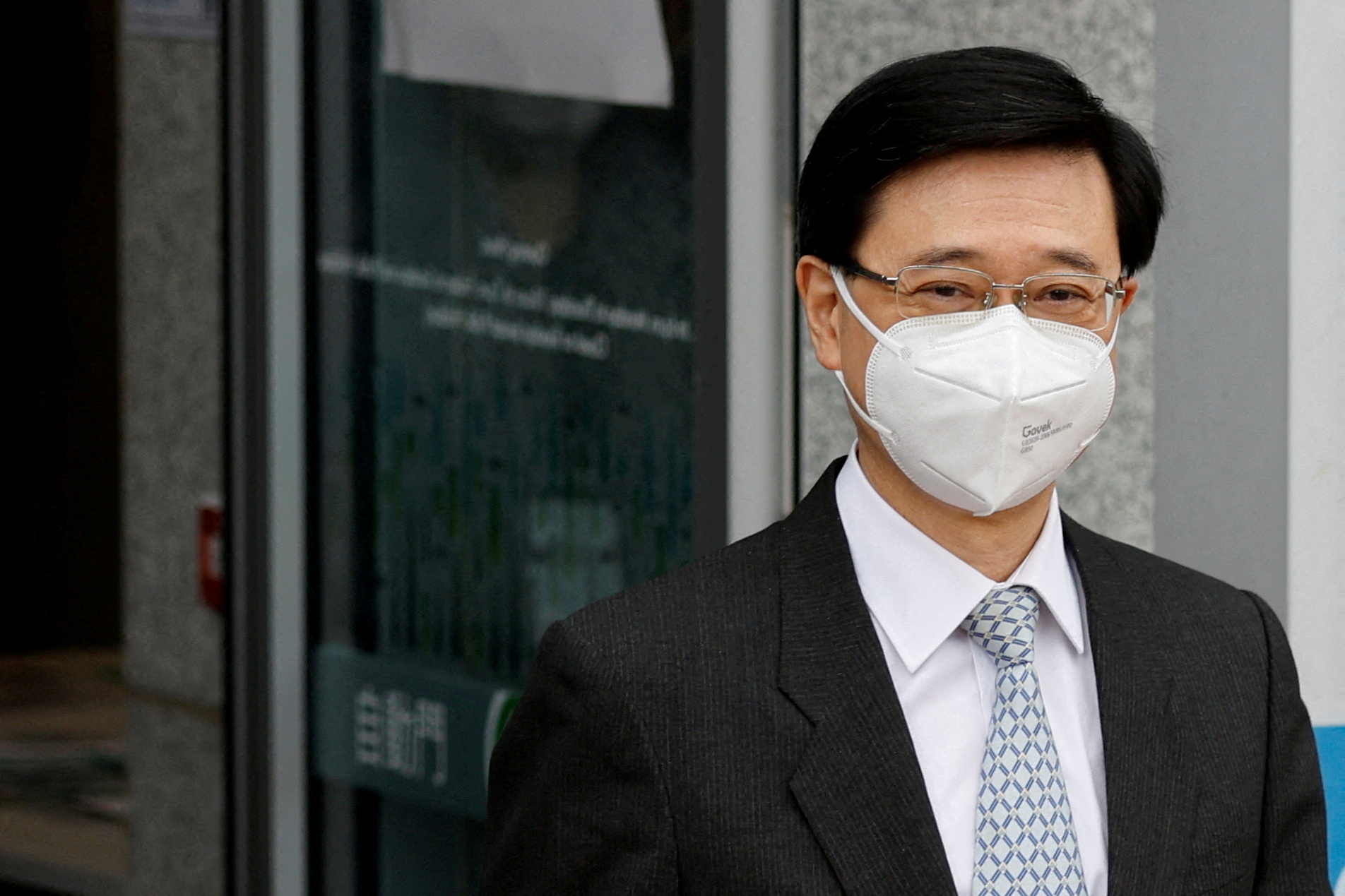John Lee vows to unify society, boost HK's global hub status as he unveils election manifesto
Sign up now: Get insights on Asia's fast-moving developments

Mr John Lee is the sole candidate running for the territory's top job in an election on May 8, 2022.
PHOTO: REUTERS
Follow topic:
HONG KONG - Hong Kong's sole chief executive candidate John Lee set out a road map for enhancing the city's status as a global hub and tackling deep-seated housing and poverty issues as he unveiled his election manifesto on Friday (April 29).
The former No. 2 official vowed to unify society and embark on a new chapter for Hong Kong under his leadership after the past three years of turmoil arising from pro-democracy protests and tight Covid-19 pandemic restrictions that had effectively shut the city from the rest of the world.
In four broad strokes outlining his overall policy directions, Mr Lee said he would strengthen governance; provide more, better and faster housing; boost Hong Kong's competitiveness and pursue sustainable development; and build a caring, inclusive society with greater upward mobility for its youth.
"After the past three difficult years, Hong Kong can and must rise again," Mr Lee said from the Hong Kong Convention and Exhibition Centre in a half-hour speech that was broadcast live on local television.
"If elected, I pledge that I will work hard to build a government led by a responsible team able to solve Hong Kong's problems... so that Hong Kong can fly high again."
Mr Lee is the only candidate running for the top job in the election on May 8. He is set to replace the incumbent Carrie Lam on July 1.
On Friday, the chief executive hopeful pledged to boost Hong Kong's status as a global financial hub by promoting its strengths as an offshore renminbi business centre and an asset and wealth management hub, among others.
Hong Kong remains a bridge between the world and mainland China, and he would work to leverage these strengths, Mr Lee said.
He did not give any timeline for when Covid-19-related travel restrictions between the city and the mainland could be lifted.
A development plan known as the Northern Metropolis project, on the border with mainland China, would become "a new engine for economic growth".
This plan, alongside a second project known as the Lantau Tomorrow Vision, would provide significantly more land to cater to the city's needs, he said.
The two mega development projects - first mooted during Mrs Lam's administration - are aimed at setting up new business focal points in Hong Kong and creating housing solutions for as many as 3.6 million people.
As one concrete way to alleviate Hong Kong's housing crisis, Mr Lee said he planned to streamline procedures to shorten residents' years-long waiting time for public housing "by about a year".
Applicants could choose to move into newly completed flats even if facilities around the estate, such as public transport networks, have yet to be fully developed, he said.
To address cross-generational poverty, Mr Lee pledged to launch an "experimental scheme" that would first reach out to 1,000 secondary school students living in subdivided flats, providing them with training and mentorship to develop their confidence and skill sets required to take them further in life.
He also promised to lower the threshold for granting the elderly living allowances.
Mr Lee said he would push forward with a plan to restructure the government as part of his strategy to achieve results-oriented governance.
Government bureaucracy has often been blamed for exacerbating Hong Kong's societal problems, such as long delays in providing people with affordable housing.
Academic Alfred Wu said Mr Lee's manifesto did not deviate much from Mrs Lam's general policy directions, and is helpful for a city "in need of some certainties" after recent years of instability.
"John Lee gave very broad solutions but did not go very much into detail on concrete plans for implementation," said Professor Wu, who specialises in China governance at the Lee Kuan Yew School of Public Policy. "He needs time to develop his own style of governance."
Mr Lee's plans for poverty alleviation are positive for society, "but the question is whether he can deliver... It will not be easy", Prof Wu added.
Resident Rita Au Yeung said she found Mr Lee's policies practical and down to earth.
"He goes back to basics and looks more at details, such as how to simplify housing processes and shorten the waiting time for homes. So I think he really understands the pain points of general Hong Kong people," said Ms Au Yeung, a human resources manager in her 50s.
"This makes me feel like perhaps he might have the makings of a good leader."
Mr Lee's manifesto factors in the views of several community and business organisations and political think-tanks after a fortnight of consultations with these groups.
He is slated to attend an hour-long televised question-and-answer session on Saturday night.

